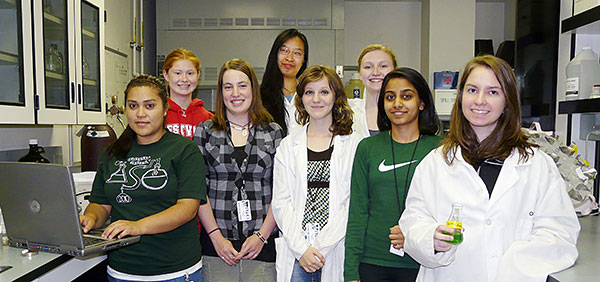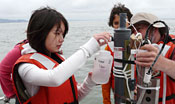You are here
High School Summer Apprenticeships 2010

CMOP hosted nine high school students* during the summer of 2010 in the Apprenticeships in Science and Engineering (ASE) program. Students worked along side scientists and graduate students performing research relative to the Columbia River estuary. The center partners with Saturday Academy to offer this 8-week summer apprenticeship. Students are at CMOP from late June to the middle of August. At the end of the summer, students will present at the ASE Symposium.
INTERN BLOGS
INTERN PROJECTS
Environmental Sensor Development
Student: Allison
Mentor: Paul Tratnyek
ASE presentation (ppt)
Project Description
One of CMOP's major scientific themes is the development of novel sensors for monitoring biogeochemical process in dynamic environments like the lower Columbia River. We are working on several such sensors (mostly microelectrodes), for parameters ranging from nitrate to specific types of microbial activity. The intern selected for this position will assist with fabrication, calibration, field testing, and possibly field deployment of these sensors. The most important requirements for this internship are a strong background in chemistry (preferably completed AP or IB level) and some familiarity with basic electronics, interfacing and data transfer to computers, etc. Optionally, this position may also involve participating in overnight field work onboard a research vessel in the Columbia River.
Biogeochemical Cycling of Manganese in the Environment
Student: Amy
Mentor: Brad Tebo
ASE presentation (ppt)
Project Description
The intern selected for this position will be working on projects investigating the biogeochemical cycling of manganese and iron in natural environments. Microorganisms, when their growth is limited for iron, produce compounds to bind forms of iron which otherwise would be unavailable to the cells. Such compounds, although primarily produced to complex with iron, can also bind certain forms of soluble manganese and thereby affect the stability of those forms. As other forms of manganese, specifically particulate manganese oxide minerals, play a crucial role in the fate of various elements, understanding the conditions and processes controlling the different forms of manganese in the environment is important. The intern will participate in identifying what microorganisms are present in the environment that are involved in cycling of manganese, what type of iron-complexing compounds are produced, and/or what form of manganese can be found. As part of the process, s/he will gain experience using traditional culture- dependent and culture-independent microbiological techniques to understand the microbes important in manganese cycling in the environment, and also learn to operate various analytical equipments to monitor the geochemical aspects. The intern will also purify iron-binding complexes.
Plankton Ecology in the Columbia River Estuary
Student: Deirdre
Mentor: Lydie Herfort
ASE presentation (ppt)
Project Description
Each year, for at least a decade, large vivid red water blooms of the plankton Myrionecta rubra (a ciliate) have occurred in the Columbia River estuary during late summer. This organism has the unique ability to acquire chloroplasts from its prey, which are cryptophyte algae, through a process known as karyoklepty. The intern selected for this position will work with a mentor at the Center for Coastal Margin Observation & Prediction (CMOP) to use multiple genetic markers to discover genetically distinct members of Myrionecta rubra and its cryptophyte prey. Intern activities will include water sample collection throughout the estuary and the coastal ocean north of the river, nucleic acid extraction, PCR amplification, preparation of samples for cloning and sequencing and sequence data analysis. The student must wear a lab coat (provided) and closed-toe shoes while working. The Center for Coastal Margin Observation & Prediction (CMOP) is a National Science Foundation Science and Technology Center, representing a large multi-institutional partnership. CMOP researchers study the health of the ocean and the impact of human activity in the Oregon and Washington coastal margins, where the Columbia River interacts with the Pacific Ocean.
Manganese-Oxidizing Microbes in the Columbia River Estuary
Student: Graham
Mentor: Dr. Brad Tebo
ASE presentation (ppt)
Project Description
Microorganisms are major contributors to many of the biogeochemical cycles (e.g. carbon and sulphur cycles) that are essential to maintaining the habitability of our planet for higher life forms. Research in the mentor's laboratory focuses on microbes that can oxidize manganese since they are important players in numerous biogeochemical cycles and processes, including biomineralization (the formation of minerals by living organisms). The intern selected for this position will be involved in a project that uses an exciting, novel microbiological technology to directly identify, isolate and characterize manganese-oxidizing bacteria from the Columbia River estuary. He/she will work side-by-side with scientists and learn about all aspects of the scientific process – from preparation of experimental reagents and general laboratory procedures to experimental planning, execution and data analysis. The student might participate in a cruise to collect water column samples for the project. The results of this project will contribute to our knowledge of the complex processes occurring in one of our nation’s greatest rivers. Where required, the student will interact with CMOP scientists from other OHSU laboratories. Applicants should possess a good formal science background, especially in biology. Importantly, the student chosen for this project will be motivated and have a strong curiosity about the natural world.
Detecting Nanoparticles and their Effects in the Aquatic Environment
Student: Jing
Mentor: Paul Tratnyek
ASE presentation (ppt)
Project Description
Nanoparticles, both natural and anthropogenic, have recently emerged as a priority topic of environmental research. In order to assess their fate and effects, however, it is necessary to have methods for detecting nanoparticles in environmental media, including water and sediment. There currently are no broadly applicable methods for this, and methods that are in use are largely unproven. Conversely, the use of nanoparticles in sensors to measure other properties of environmental media is emerging as a possible route to improved methods for environmental monitoring. This project will investigate the overlap between these two scenarios, where the sensor is used to measure the deposition of the nanoparticles onto the probe. Possible applications of the results range from monitoring effects of salinity on particle coagulation in estuaries to characterizing the transport of nanoparticles injected for remediation of sediments or groundwater.
Internship in Ocean Observatories
Student: Julia & Sierra
Mentor: Antonio Baptista
ASE presentation (ppt)
Project Description
Ocean observatories are novel integrations of observations from environmental sensors, simulations via 3D computer models, and information flow and visualization systems, which together put environmental information at the fingertips of scientists, managers, educators and the general public. That information is essential to understand and sustainably manage the oceans and their coastal margins, under increasing human and climate stresses. The interns selected for this position will be integrated into the multi-disciplinary team at the Center for Coastal Margin Observation & Prediction (CMOP) that operates one of the most advanced ocean observatories in the world, focused on the Columbia River estuary and ocean plume (http://www.stccmop.org/saturn.) Those interns will be exposed to all aspects of the observatory, from engineering to science and outreach. Focus will be on scientific data analysis. The interns will work under the supervision of two mentors, and will be assigned tasks that require independence, judgment, teamwork and communication skills. There is a strong preference for candidates with interest and skill in mathematics and in physics, chemistry or biology. Skill or ability to learn visualization and/or statistical software packages is a must. Programming skills are a plus, but not a requirement.
Remediation of Environmental Contaminants
Student: Katherine
Mentor: Paul Tratnyek
ASE presentation (ppt)
Project Description
The intern for this position will participate in research on the degradation of pollutants in the environment. In streams, sediments and groundwater, organic pollutants undergo chemical reactions that transform them into less (or sometimes more) harmful products. Understanding these degradation reactions is one of the major challenges in environmental science and engineering. The intern will participate in laboratory studies of the chemistry of contaminant remediation. This will involve measurement of organic chemical concentrations by gas and/or liquid chromatography and various types of spectroscopy. The results should help contribute to the scientific basis for regulation and remediation of environmental contamination by organic chemicals. Applicants should have completed a year of chemistry (including basic principles and laboratory techniques) by the beginning of the internship. Strong math and computer skills are also required.
Developing Ocean Science Curriculum Resources for Spanish-speaking Communities
Student: Monica
Mentor: Grant Law
ASE presentation (ppt)
Project Description
The SATURN system provides researchers an unprecedented level of detailed information on both the Columbia River estuary, it's plume, and the Pacific Northwest shelf. SATURN also is a tremendous resource for educators, providing both data and figures illustrating key physical and chemical processes, and providing a mechanism for students to test hypotheses. To help educators take full advantage of the SATURN system, we are developing a curriculum to guide educators through SATURN's many resources, and to link them with hands-on activities that can be performed in the classroom to reinforce basic concepts. In an effort to make the curricula as widely useful as possible, Monica is helping us to refine and improve the activities, and translating the text into Spanish.
* Note: CMOP does not post high school interns last name in an effort to protect the minor from identity theft .







